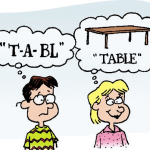Research Topic: Picture-Thinking and Dyslexia
Dyslexia is strongly associated with a non-verbal thought process. Most dyslexic individuals report that they think mostly in pictures or other sensory impressions rather than words. This thought process is at the heart of many common symptoms of dyslexia, including difficulties with word retrieval (“Rapid Automatic Naming”) and phonetic decoding and segmentation.
Research Articles:
Rachel Lambert, Edmund Harriss. Insider accounts of dyslexia from research mathematicians. Educational Studies in Mathematics. Published: 07 February 2022, (2022).
Goranova, Zheni O., Olson, Andrew C. , Krott, Andrea. What about lexical competition? Exploring the locus of lexical retrieval deficits in adults with developmental dyslexia. Neuropsychology. , (2021).
Janette B. Jacobs, Elizabeth J. Newton, James H. Smith‐Spark. Dyslexia and syllogistic reasoning in adults: Differences in strategy usage. Dyslexia. 1– 15, (2021).
Goodmon, Leilani B.; Alyssa Parisi, Patrick Smith, Erin Phillips, Taylor Cox, Lauren Dill, Amanda Miller. The effect of landscape photograph type on aesthetic judgments, attention, and memory in children with dyslexia. Dyslexia. First published: 10 November 2019, (2019).
J. Ganesh Kumar and Maya Rathnasabapathy. A Study on the Difference in Various Methods of Recollecting Words Between Mainstream Children and Children with Dyslexia. Journal of Engineering and Applied Sciences. 13: 5831-5834., (2018).
Kramer, Sara. Is there a link between perceptual talent and dyslexia?. The Journal of Inclusive Practice in further and higher education. Issue 7. pp 34-48, (2016).
Bacon, Alison M., and Simon J.Handley. Reasoning and Dyslexia: is Visual Memory a Compensatory Resource?. Dyslexia. 20, pages 330– 345, (2014).
Bacon, Alison; Fabrice B. R. Parmentier, Polly Barr. Visuospatial memory in dyslexia: Evidence for strategic deficits. Memory. Pages 189-209, (2012).
Nicole Davis , Laura Barquero, Donald L Compton, Lynn S Fuchs, Douglas Fuchs, John C Gore, Adam W Anderson. Functional correlates of children's responsiveness to intervention. Developmental neuropsychology. Developmental Neuropsychology. Volume 36- Issue 3, Pages 288-301, (2011).
Bacon AM, Handley SJ. Dyslexia and reasoning: the importance of visual processes.. British Journal of Psychology,. Volume 101, Number 3, pp. 433-452 (August), (2010).
Tafti, Mahnaz Akhavan; Hameedy, Mansoor Ali; Baghal, Nahid Mohammadi. Dyslexia, a deficit or a difference: Comparing the creativity and memory skills of dyslexic and nondyslexic students in Iran. Social Behavior and Personality: an international journal,. Volume 37, Number 8, pp. 1009-1016(8), (2009).
Bacon AM, Handley SJ, McDonald EL. Reasoning and dyslexia: a spatial strategy may impede reasoning with visually rich information.. British Journal of Psychology. Vol 98 (Pt 1): 79-92, (2007).
Matthew H. Schneps, L. Todd Rose, Kurt W. Fischer. Visual Learning and the Brain: Implications for Dyslexia. Mind, Brain, and Education. Volume1, Issue3, Pages 128-139, (2007).
Gregory V. Jones. Deep dyslexia, imageability, and ease of predication. Brain and Language. 24(1), 1–19, (1985).




